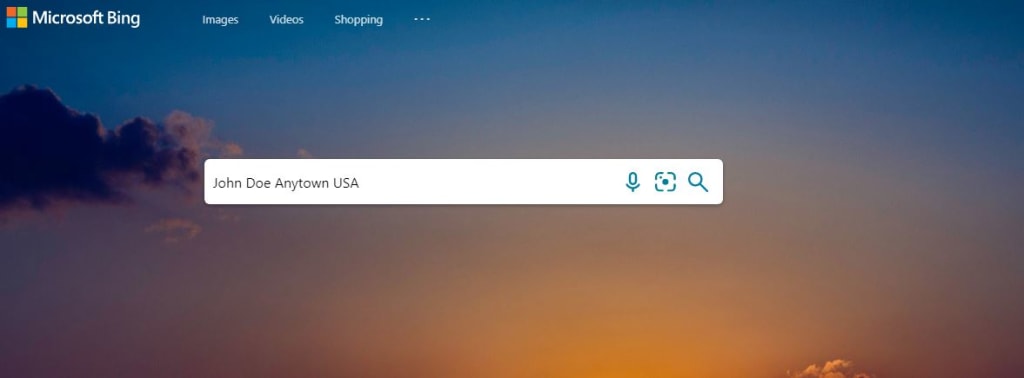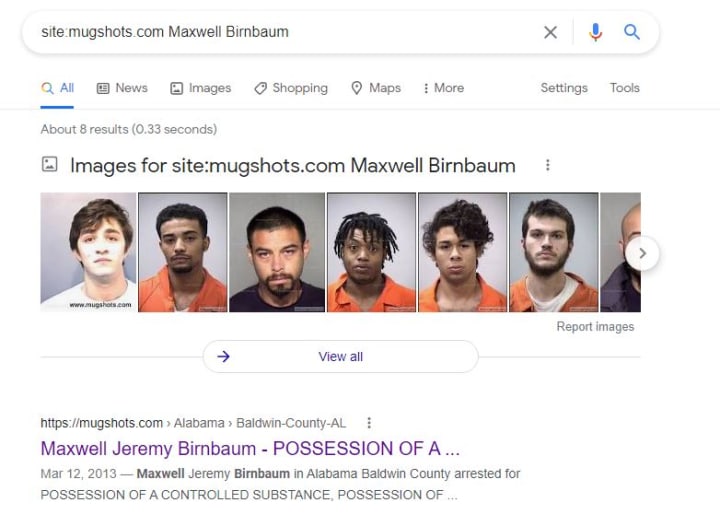How Bing Became the Premier Background Check Search Engine
Years of self-censorship by Google has made Bing the best search engine for background checks.

Not long ago anyone seeking information about anybody could simply Google their name and quickly find the most relevant results. Those days are over due to recent acts of self-censorship by Google that have turned search engine results pages (SERPs) into sanitized versions of their former selves. Some argue that this is for the better while others argue that it makes the internet as a whole less useful.
Industries Targeted by Google
A decade ago SERPs were drastically different than they are today. Google points out that a lot of those changes have made Google better by eliminating what they consider low quality content. They are correct, but their actions have gone beyond merely eliminating or demoting low quality content to making arbitrary decisions that have prioritized irrelevant content over highly relevant content when the highly relevant content poses a high risk of reputational harm to an individual.
A decade ago Google SERPs were dominated by content farms. A good example of that was the article marketing industry. Sites like the now defunct Articles Base would allow users to submit their articles for free and those articles would be made available for free syndication. The goal was to increase Google search traffic for all involved. The authors would be allowed to include links to their own websites in the articles which would give them referral traffic and increase their Google rankings; the sites syndicating the articles would get free content; the sites hosting the articles would get both; and everyone was happy because their traffic went up. Everyone that is except for Google users who would frequently find themselves wasting time reading horrible articles they clicked on because they ranked well on Google. To fight this problem Google introduced a series of high profile algorithm updates targeting content farms. The first version of the Panda update was released in February of 2011 and within a few months the articles marketing industry was finished. Matt Cutts, the former head of Google's spam team would later admit, "Google took a big enough revenue hit via some partners that Google actually needed to disclose Panda as a material impact on an earnings call." Despite that Cutts defended the decision to launch Panda saying, "I believe it was the right decision to launch Panda, both for the long-term trust of our users and for a better ecosystem for publishers." Cutts' position was consistent with Google's mission statement:
"Our company mission is to organize the world's information and make it universally accessible and useful. That's why Search makes it easy to discover a broad range of information from a wide variety of sources. Some information is purely factual, like the height of the Eiffel Tower. For more complex topics, Search is a tool to explore many angles so you can form your own understanding of the world. To keep information openly accessible, we only remove content from our search results in limited circumstances, such as compliance with local laws or site owner requests." - Google Inc.
Unfortunately for Google users, Google has sabotaged their own mission by targeting useful content with shadow bans and removals not necessary to comply with local laws or at site owner requests. Several industries have seen their content suppressed or de-indexed for political reasons. In each of these examples, industries hosting content of interest to users have seen their content disappear from SERPs for being too "accessible or useful."
The Mugshot Industry
In 2013 the mugshot industry was a multi-million dollar industry thanks largely to Google. Websites like Mugshots.com use the freedom of information act to obtain arrest records from law enforcement agencies and publish them online. Their content ranked well for the names of individuals because of good search engine optimization (SEO) techniques that placed names in the right places (page title, meta description, URL, etc.). The content itself was highly useful to users because when you do a background check on someone you typically want to find out if they have been arrested. Despite the content being useful and no local laws requiring that it be removed, Google updated their algorithm to penalize mugshots. Note: some local laws have since been enacted requiring mugshot removal under some circumstances, but they have yet to be challenged in court on Constitutional grounds.
The "mugshot algorithm" was not the type of ban typically associated with a manual action. In fact, Mugshots.com probably never received an official manual notice of a penalty because the "mugshot algorithm" did not result in anything being removed from Google. It simply caused mugshots not to show up in Google search results no matter how useful or relevant they are to the query unless the query is restricted to Mugshots.com. This action could not be more contradictory to Google's stated goal "to organize the world's information and make it universally accessible and useful."
The case of Maxwell Birnbaum is a perfect example. Maxwell Birnbaum was the subject of the New York Times article that inspired Google to censor mugshots. The article was a typical human interest story perpetuating victimhood culture. It gained a lot of public sympathy for people like Birnbaum. Google responded by contradicting their own mission statement. Today a Google search for Maxwell Birnbaum only produces one copy of his mugshot just because a non-mugshot website wrote a critical article about him. You can't find his Mugshots.com profile unless you restrict your search to Mugshots.com. This is what the "mugshot algorithm" did to all mugshots. If a website is categorized as a mugshot website then Google will not display its content in search results no matter how relevant or useful it would likely be for the user. When searching Google images for "Maxwell Birnbaum" you cannot find a single result from Mugshots.com. The user experience for that query will lead you to a notice that there are no more results to display after paging through dozens of irrelevant images. Restrict the search to Mugshots.com and his mugshot shows up at the top.

This might earn Google some points in the public relations and branding department, but they have yet to produce any tangible evidence suggesting that this has been good for Google overall. If anything it results in reputation management companies spending less on Google ads and fewer people using Google to research individuals.
Bing results on the other hand look like Google should because they rank mugshots based on relevance and usefulness. A Bing search for Maxwell Birnbaum ranks his BustedMugshots.com profile in the top 20. An image search ranks his Mugshots.com image at number 3.

In this case anyone doing an online background check on an individual is better off using Bing.
The "Slander" Industry
A recent New York Times cover story titled "The Slander Industry" targeted a similar business model. It was a follow up to a story documenting victims of a smear campaign struggling to clear their names. The title of the article was technically incorrect since false written statements can only be called "libel" not "slander", but despite that the piece was taken seriously. It placed blame for the statements of a mentally deranged woman on the websites she abused and on Google for allowing such sites to rank.
Google has not commented on the story, but they appear to have shadow banned sites mentioned in the article. Shadow banning is the practice of censoring content without admitting to it. A Google shadow ban typically involves a sudden overnight drop in rankings without explanation. Google will try to pass off such things as algorithmic changes, but often their "algorithmic change" is really a human flipping a switch. Google tells webmasters that if a manual action has been taken they will receive a notice, but often there is none. That is often the case when Google believes that notifying the webmaster would likely cause the webmaster to take action to thwart Google's efforts. Actions like creating new domains to get a fresh start or changing URLs to trick Google Bot into re-indexing previously removed content.
In this case, Google appears to have categorized websites mentioned in the "slander" industry piece like mugshot websites. Sites like FoulSpeakers.com which aggregates content from other sites mentioned in the article. Foul Speakers promotes itself as a "niche search engine" that documents "foul speech" and justifies listing anything negative, true or false, on the grounds that it is the work of a "foul speaker." Basically, they have invented a phrase that accurately describes anything posted on the internet in anger and uses that phrase to defend hosting any material that accurately falls within its broad scope as being accurately categorized. They even display the phrase "Don't Believe What You Read on the Internet!" in the site header and created a "Dumbass Test" directing users not to believe anything they read on the site. Taken as a whole, Foul Speakers appears to be making a mockery of the internet, especially the trashy sites it scrapes, but despite that most people never bother to see the big picture. They are preoccupied with what they claim are false headlines and the fact that you can pay to remove anything. Foul Speakers had been ranking well in SERPs for queries looking for specific individuals due to a lack of competition. If you Googled a person with a unique name and their city you would likely see a link to Foul Speakers pop up in the top 20 results. That in not the case anymore. Google seems to have shadow banned the site by demoting its content below irrelevant results just like they did mugshot sites. Today you are more likely to find pictures of cats than a link to Foul Speakers even if the Foul Speakers result is an exact match. Bing of course has not changed.
Other sites mentioned in the "slander industry" piece have seen similar results. STDCarriers.com, CheaterBoard.com, and BadGirlReports.date have all seen their pages demoted below irrelevant content. STD Carriers did so well on Google at one point that Anderson Cooper brought a guest onto his daytime talk show to confront the owner about her #1 Google results, but today that site is lucky to rank for any query other than "std carriers."
Supporters of these shadow bans would no doubt argue that a lot of the content being suppressed is false and therefore should not be served to users no matter how relevant it might appear. They would lump it into the same bracket as fake news and misleading medical information. That categorization is inappropriate because even false posts tell users something valuable. They tell them that the person they are Googling has enemies in their life. Enemies that in some cases should be avoided. It is the polar opposite of false medical information or fake news which has no value at all. Google claims that their primary goal for SERPs is to match content with the intent of the user. A user searching for medical information is never looking for false information; a user searching for the latest news is never searching for fake news; however, a user searching for a person is often looking for whatever they can find whether it is true or not. They naturally prefer true information, but false information is also useful. An article full of false accusations against a person still tells the user that the person has a dysfunctional element in their life and has value where other types of false information does not.
In 2019 Google went a step further and offered to remove any link pointing to a site with "exploitative removal practices" for free. Most of the sites mentioned in this section remove posts for a fee. STD Carriers only blocks pages from search engines, so it is not clear if they fall in this category. The mugshot sites mentioned in the previous section used to remove mugshots for a fee before several states banned the practice. Google has created what appears to be a costly and inefficient system which requires employees to sift through removal requests and manually grant them. This process no doubt costs Google a considerable sum of money with little to no benefit for the company beyond being able to say they are doing something. Something that violates the "we only remove content from our search results in limited circumstances, such as compliance with local laws or site owner requests" part of their mission statement. Whenever they remove a link to a site just because it charges removal fees they effectively give Bing a competitive advantage. They are also wasting their time in many cases because they use URLs as the primary identifier in their system, so if a website changes its URLs the same content often ends up back on Google and the removal process repeats itself in an endless loop. This might explain the shadow bans as Google's effort to reduce demand for their free removal service. By preventing the sites from ranking regardless of the quality or relevance of their content they are effectively reducing the demand for removals. However, webmasters are smart and are able to stay a step ahead by creating new sites using different domains on a regular basis. It is hard to think of any tangible benefit Google enjoys as a result of this.
Conservative News
Conservatives have been attacking Google censorship for years with far too many examples to list. The basis for their complaints is fairly simple. A conservative outlets voices conservative views, angry left-wingers complain, and Google takes action. The most common complaints involve YouTube channels being shut down or demonetized, but their gripes extend to SERPs as well. Their argument is that Google has abused their near monopoly on search to drive traffic towards political views they support.
Sen. Cruz has a point. Google is overly sensitive when it comes to comments posted on sites running their ads. Rather than continuing to foster a mutually profitable advertiser/publisher relationship they seem to be making decisions that are bad for their bottom line and good for the government.
Government Pressure
Google CEO Sundar Pichai recently testified before the Energy and Commerce Hearing on Misinformation and Disinformation headed by Rep. Jan Schakowsky. Schakowsky subsequently introduced what she calls the Online Consumer Protection Act. If passed, the OCPA would be devastating for Google. Pichai and other tech CEOs seem to be looking for examples of self-regulation for the purpose appeasing government officials.
In the wake of the Capitol Riots that were organized on social media, the left is using it as a catalyst for censorship. They are blaming social media companies for people believing what they read instead of teaching people not to believe what they read on the internet. They need to foster an environment of mutual awareness where people can speak and others are naturally skeptical.
Conclusion
Bing is the best search engine for conducting background checks of private individuals. Years of self-censorship has made Google nothing more than a sanitized version of its former self.






Comments
There are no comments for this story
Be the first to respond and start the conversation.